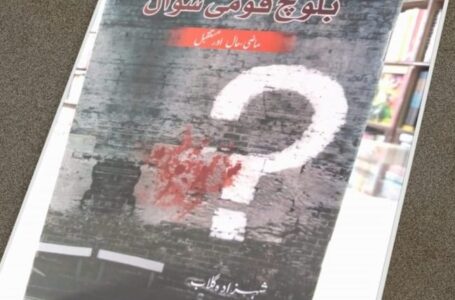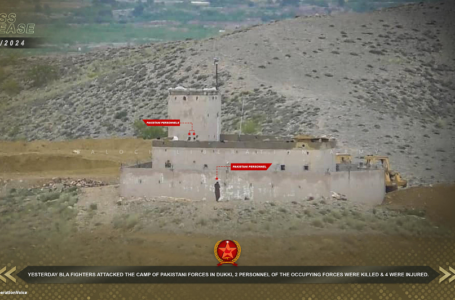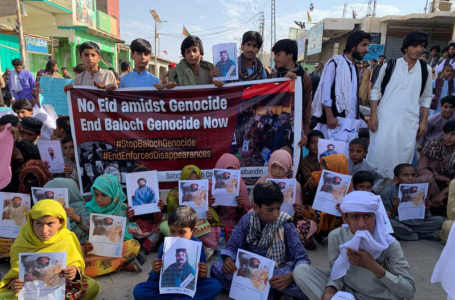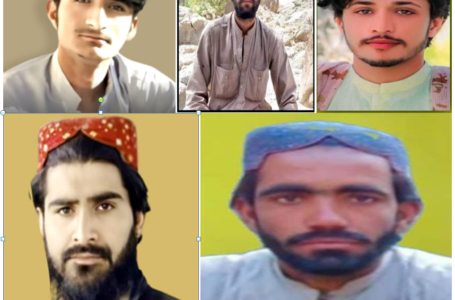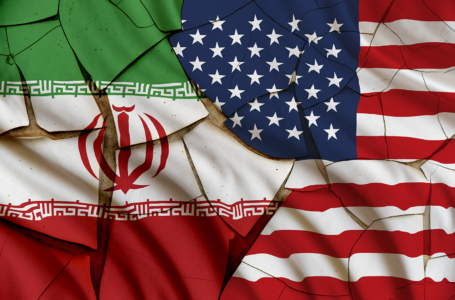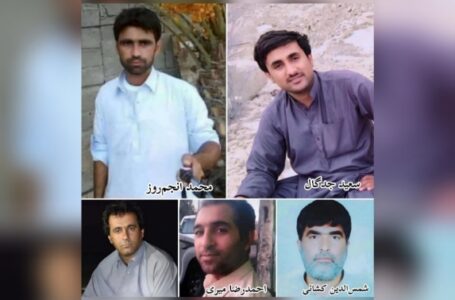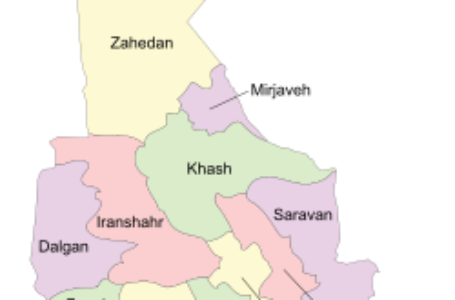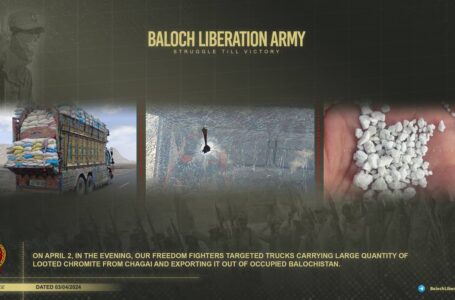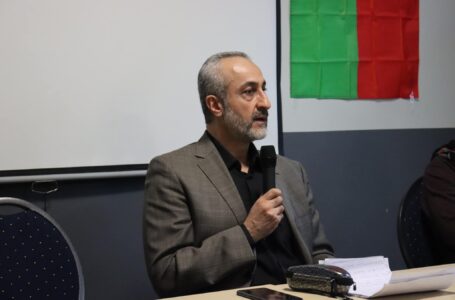Foreign countries should refrain from becoming Pakistan’s partner in Baloch Genocide: FBM
United Nations World Refugee Day: Plight of oppressed nations highlighted at California conference
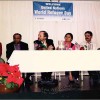
CALIFORNIA: On the occasion of The United Nations World refugee day, on June 26, 2016, the Director of the Kashmir Hindu Foundation held a seminar in Los Angeles, USA. Presentations from representatives of oppressed and occupied nations from a multitude of ethnicity participated in the program. Dr. Amrit Nehru, Director, Kashmir Hindu Foundation, Dr. Richard Benkin, human rights activist and journalist, Ms. Yangchan Gakyel, President Tibet Association, Dr. Saghir Sheikh, World Sindhi Association and Aziz Baloch, Coordinator, International Voice for Baloch Missing Persons(IVBMP), Canada were some of the speakers at the program.
The program organizers Dr. Amrit Nehru and Kamlesh Chauhan, author, novelist and poet, expressed their views at the seminar. Dr. Amrit Nehru famously quoted that this was “the first time Baloch, Sindhi, Tibetan and Bangladesh speakers have come together on one platform”. All speakers vividly described the suffering and human rights violations in their respective countries or regions at the hands of tyrannical, dictatorial, fundamentalist and communist regimes. Kamlesh Chauhan spoke thus, “China has to be out of Balochistan, Pakistan has to give the land back to the original natives of Balochistan and China has to free Tibet.” The audience enthusiastically participated in several panel discussions.
The following speech was presented by Aziz Baloch, human rights activist, coordinator of the Voice for Baloch Missing Persons (VBMP), Canada, at the seminar. “It is a pleasure to be here, on behalf of International Voice for Baloch Missing Persons (IVBMP). I am thankful to the organizers of this event Dr. Amrit Nehru and Dr. Richard Benkin for giving me this opportunity to highlight the issue of human rights violations in Balochistan. I would like to shed some light on internally displaced people (IDP’s) of Baloch origin and two decades of ongoing human rights violations in Balochistan.
First, I would like to mention that Balochistan was historically a sovereign state. A large portion of Balochistan had been forcefully occupied by Iran in 1928; when the then ruler of the Iranian occupied (Western) Balochistan territories Mir. Dost Muhammad Khan Baloch resisted the forceful occupation. In the end, he paid the ultimate price for resistance when he was betrayed and hanged by Shah Reza Pahlavi after initially being offered a peaceful way to resolve the matter. Since then, the native Baloch in their own land have been seeking justice and equality while successive Iranian regimes have been summarily executing Baloch youth and activists.
In 1947, when the British Raj came to an end, Pakistan and India were separated and Balochistan also declared its full independence. Later, the rulers of Kalat (Balochistan) were betrayed by their lawyer Muhammad Ali Jinnah; incidentally also the founder of Pakistan. Muhammad Ali Jinnah is often regarded as being the cause of deaths of millions of Muslims, Hindus, Christians and Sikhs during the bloody division of the subcontinent in 1947. In March 1948, the Pakistan army invaded Kalat (Balochistan) against the wishes of the Baloch population and Balochistan was forcibly annexed and has been occupied by Pakistan and its brutal military forces ever since.
Both these betrayals are forever inscribed upon the history of the Baloch people. Thereafter, the resilient Baloch people are continuing their daily struggle for birth right, language, culture, identity and resources.
Since 2005, when the 5th military operation began in Balochistan instances of internally displaced people (IDP’s) and human rights violations across Balochistan has drastically increased. On October 2007, the ‘International Crisis Group’ a European based organization working to prevent conflicts worldwide; published a report titled “Pakistan’s Forgotten Conflict in Balochistan”; detailing the plight of internally displaced Baloch people. According to this report – “Since December 2005 when military operations began, at least 84,000 people have been displaced by the conflict in Dera Bugti and Kohlu districts alone.”
According to the UNICEF internal assessment in July – August 2006 that was leaked to press; the displaced persons, mostly women (26,000) and children (33,000) were living in makeshift camps without adequate shelter, medical services or food in Jaferabad, Nasserabad, Quetta, Sibi, and Bolan districts. Over 28 percent of deaths among those surveyed were children under five. However, Pakistan denied aid agencies such as Pakistan Edhi Foundation and media access to the areas which they supposedly returned. It wasn’t until December 2006, that the first Pakistani official acknowledged of the gravity of the humanitarian crisis.
Pakistan has further embarked upon the China-Pakistan Economic Corridor (CPEC) in Gwadar, which the Baloch consider to be the anti-Baloch nexus of China and Pakistan. Due to CPEC, the Pakistani army has further intensified military operations in Kohlu, Dera Bugti, Sibi, Quetta, Khuzdar, Awaran and Makran. Hundreds of Baloch have been killed during raids, aerial bombardments and search operations. Thousands of houses have been looted and burned to ashes. As a result, there is an intense resistance against Chinese involvement. The Baloch see no difference between atrocities committed in Syria and Iraq and the atrocities in Balochistan. The Pakistani army and intelligence agencies do not allow access to the media or the UN international agencies in the ongoing conflict. Therefore, the exact number of internally displaced Baloch people (IDP’s) is difficult to determine.
I want to remind the UN and international community that in 2006, the Human Rights Commission of Pakistan (HRCP) cited numerous instances of intimidation, arbitrary arrests, torture, disappearances and extra judicial killings in Balochistan. The Voice for Baloch Missing Persons (VBMP), a human rights organization led by family members of abducted Baloch citizens, reported that more than 20,0000 Baloch have been illegally arrested by Pakistani security forces & intelligence agencies. The VBMP also asserts that more than 6000 Baloch individuals have been extra-judicially executed in custody. Among the victims are professors, political leaders, students, lawyers, doctors, journalists, artists and activists. The International Voice for Baloch Missing Persons (IVBMP) registered many a case to find abducted Baloch activists at the UN Working Group on Enforced or Involuntary Disappearances in Geneva.
In September 2012, a UN Working Group with five members, Mr. Oliver de Frouville (France) Chair-Rapporteur, Mr. Jeremy J. Sarkin (South Africa), Mr. Osman El Hajjiev (Lebanon), Mr. Ariel Dulitzky (Argentina) visited Quetta and met with the families of abducted Baloch political and human rights activists and representatives of Voice for Baloch Missing Persons. Afterwards they submitted their recommendation to the Pakistani government about the significantly deteriorating human rights situation of Balochistan. The working group’s recommendations were completely ignored. Sadly, although the victims of abducted Baloch families, many who even participated in the historical ‘Long March’ in 2013 from Quetta to Karachi and all the way to the Islamabad UN office yet there has been no concrete action has been taken by Pakistani judiciary or by the civilian government. The International Voice for Baloch Missing Persons have also had several follow up meetings with the WGEID members after their visit to Balochistan.
The widespread and systematic human rights violation has been steadily intensifying with each passing day. Recently, on June 20th 2016, Pakistani military forces killed five innocent Baloch civilians in Mashky. All five victims were enforced disappeared and were executed in custody. Sarfaraz Baloch abducted in August 2014, Naik Muhammad abducted February 2016 in Mashky, Abdul Karim and Allah Baksh abducted June 18, from Ragy region of Mashky Balochistan were all killed. Early on in 2016, the Pakistan military forces massacred 35 innocent civilians and abducted as many as 200 people in the Kalat area of Balochistan. Among the 35 victims, 15 of them were delivered to the Quetta civil hospital by security forces. To prevent the bodies from being identified and protect the narrative that the victims were terrorists; the authorities made no efforts to identify the bodies and hastily buried the victims at an undisclosed/unmarked location outside the city late in the night.
According to another local report, in November of 2015 the Pakistani army killed and tossed several Baloch activists from Gunship helicopters to the ground in Mashky. In some cases, the families of victims have discovered their loved ones hung upside down from trees. The dead bodies are usually severely mutilated and in one instance Pakistan Zindabad” (long live Pakistan) was carved with knives into the victim’s body. In another instance a note was found in the pocket of a dumped Baloch victim who was killed during the religious festival Eid day by Pakistani forces; the note read “this is an Eid gift”.
In addition to the perpetual abductions and dumping of Baloch people; mass graves containing as many as 160 dead bodies have been discovered in Tutak, Khuzdar. Although most of the recovered bodies were extremely decomposed and unrecognizable; local families from Tutak have expressed serious concerns that many of the bodies found in the mass graves are none other than their missing loved ones, who were abducted by Pakistan’ security forces in previous military operations in the same area.
The Chief Justice of Pakistan admitted on July 11, 2012, ” Enough evidences are available of the involvement of the Frontier Corp (FC) in picking up every third missing person.” His statement was published on Express Tribune. Footage was shown during the hearing inside the Balochistan high court wherein Pakistani paramilitary forces (FC) in uniform were seen abducting a Baloch activist from a hotel. FC personnel were seen escorting Mohammad Khan Marri and Mehrab Baloch in a military vehicle. Later their mutilated dead bodies were found dumped on the outskirts of Quetta. They were killed despite the High Court’s order that they must be produced before the court in the next hearing. There is an abundance of such evidence that state forces, intelligences agencies and their commissioned death squads are involved in the disappearances of Baloch people and their enforcement of a ruthless “kill and dump” state policy.
The Pakistan army, its notorious intelligence agency ISI and institutions are also backing dangerous extremist groups. A multitude of state endorsed extremists and radical groups with different names are killing minorities such as Shia Hazara, Hindus, Christians, Sikhs, Ahmadiyas, and Zikri. In Pakistan, both religious and ethnics minorities are victims of State back extremist groups such as Lashkar-e-Jhangvi, Ansar-ul-Islam, Lashkar-e-Khorasan, Lashkar-e-Tayba, and many others including the Taliban, Haqqani Network and Quetta Shura. Not only are religious extremist group killing secular people and minorities in Pakistan but the state of Pakistan regards them as their national asset to use them to blackmail the international community and get funds in the name of war against global terrorism. Taliban’s leaders Mullah Mansoor who was killed by a US drone attack in Nushky, Balochistan was found to be in possession of valid Pakistani ID cards and passport issued by Pakistan state authorities in Balochistan.
For the Baloch the only hope left is the UN, the international human rights organizations and the larger global community to come forward and lend their moral support in order to stop the ongoing genocide of Baloch people.
Many Baloch leaders, activists and the Baloch community around the globe is very frustrated by the lack of response to the inhuman atrocities inflicted upon Baloch people. Despite extensive evidence marshalled by respected independent institutions such as Amnesty International, UNPO (unrepresented nations and people’s organization), International Crisis Group of European reports, Human Rights Watch reports, and UN Working Groups findings and recommendations to the Pakistani authorities, there has been no response from UN and democratic civilized governments.
Article 2 of the Convention for the Prevention and Punishment of the Crime of Genocide states that “Genocide is defined as acts committed with intent to destroy, in whole or in part, a national, ethnical, racial or religious group.” Pakistan’s activities in Balochistan have precisely fulfilled every prerequisite to definitively qualify their actions as genocide; (yet they are inexplicably exempt from any accountability !!!).
On behalf of the Baloch people, the International Voice for Baloch missing Persons appeals to the UN, ICRC, UNICEF, UNESCO and Human Rights Watch that they should directly reach out to the thousands of victims of internally displaced and abducted Baloch families and offer their moral and comprehensive support.
It’s time for respected world bodies to honor the Universal Declaration of Human Rights and enforce the Convention for the Prevention and Punishment of the Crime of Genocide, before it’s too late.” The Secular and liberal Baloch cannot become an extinct community.
See more at: https://www.myind.net/united-nations-world-refugee-day#.dpuf

